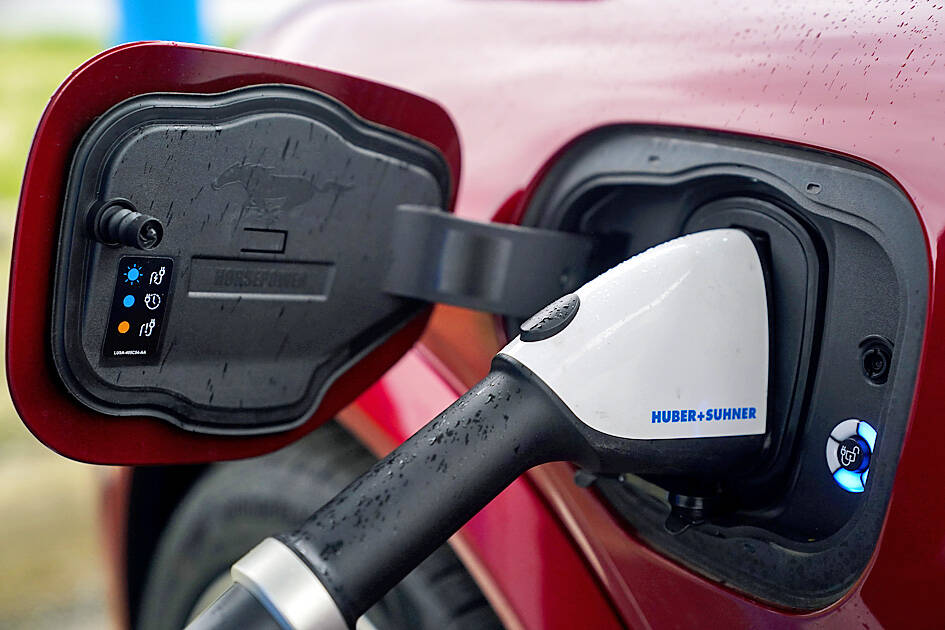The US government gave vehicle manufacturers a reprieve on Friday when finalizing electric vehicle (EV) tax credit rules, by letting vehicles that contain Chinese graphite qualify for the consumer credits through 2026.
The confirmation came as the US Department of the Treasury and Internal Revenue Service published final rules on the clean vehicle provisions under US President Joe Biden’s landmark climate action plan, the Inflation Reduction Act.
Washington has been seeking to reduce its burgeoning EV industry’s reliance on China.

Photo: AP
NEW RULES
Starting this year, new rules came into effect restricting Chinese content in batteries if they were to qualify for EV tax credits of up to US$7,500.
From next year, a qualifying clean vehicle cannot contain critical minerals from businesses controlled by a “foreign entity of concern” such as China, Russia or North Korea.
However, in the final rules, the Biden administration also gave vehicle manufacturers another two years to improve sourcing of materials such as graphite that are considered tough to trace to their origin.
“The final rules being issued today strengthen and secure supply chains and provide certainty for manufacturers and taxpayers,” the department said.
John Bozzella, president of the Alliance for Automotive Innovation, a Washington lobby representing vehicle manufacturers, said the rules “appear to recognize the realities of the global supply chain.”
He said that they provide “temporary flexibility in terms of where the critical minerals in EV batteries can be sourced.”
“That’s helpful as more automotive supply chains and battery production is localized to the US and our allies,” he added.
CRITICISM
However, US House of Representatives Select Committee on the Chinese Communist Party chairman John Moolenaar said that the rule deepens the country’s reliance on China, urging the Biden administration to “reverse course.”
US Senator Joe Manchin, the Democratic chairman of the US Senate Energy and Natural Resources Committee, said that through the new rule, the Biden administration “is effectively endorsing ‘made in China.’”
Despite the tax credits, sales of EVs grew only 3.3 percent to about 270,000 from January through March, far below the 47 percent growth that fueled record sales and a 7.6 percent market share last year. The slowdown, led by Tesla Inc, confirms vehicle manufacturers’ fears that they moved too quickly to pursue EV buyers.
The EV share of total US sales fell to 7.15 percent in the first quarter, according to Motorintelligence.com.

UNCERTAINTY: Innolux activated a stringent supply chain management mechanism, as it did during the COVID-19 pandemic, to ensure optimal inventory levels for customers Flat-panel display makers AUO Corp (友達) and Innolux Corp (群創) yesterday said that about 12 to 20 percent of their display business is at risk of potential US tariffs and that they would relocate production or shipment destinations to mitigate the levies’ effects. US tariffs would have a direct impact of US$200 million on AUO’s revenue, company chairman Paul Peng (彭雙浪) told reporters on the sidelines of the Touch Taiwan trade show in Taipei yesterday. That would make up about 12 percent of the company’s overall revenue. To cope with the tariff uncertainty, AUO plans to allocate its production to manufacturing facilities in

TAKING STOCK: A Taiwanese cookware firm in Vietnam urged customers to assess inventory or place orders early so shipments can reach the US while tariffs are paused Taiwanese businesses in Vietnam are exploring alternatives after the White House imposed a 46 percent import duty on Vietnamese goods, following US President Donald Trump’s announcement of “reciprocal” tariffs on the US’ trading partners. Lo Shih-liang (羅世良), chairman of Brico Industry Co (裕茂工業), a Taiwanese company that manufactures cast iron cookware and stove components in Vietnam, said that more than 40 percent of his business was tied to the US market, describing the constant US policy shifts as an emotional roller coaster. “I work during the day and stay up all night watching the news. I’ve been following US news until 3am

COLLABORATION: Given Taiwan’s key position in global supply chains, the US firm is discussing strategies with local partners and clients to deal with global uncertainties Advanced Micro Devices Inc (AMD) yesterday said it is meeting with local ecosystem partners, including Taiwan Semiconductor Manufacturing Co (TSMC, 台積電), to discuss strategies, including long-term manufacturing, to navigate uncertainties such as US tariffs, as Taiwan occupies an important position in global supply chains. AMD chief executive officer Lisa Su (蘇姿丰) told reporters that Taiwan is an important part of the chip designer’s ecosystem and she is discussing with partners and customers in Taiwan to forge strong collaborations on different areas during this critical period. AMD has just become the first artificial-intelligence (AI) server chip customer of TSMC to utilize its advanced

Six years ago, LVMH’s billionaire CEO Bernard Arnault and US President Donald Trump cut the blue ribbon on a factory in rural Texas that would make designer handbags for Louis Vuitton, one of the world’s best-known luxury brands. However, since the high-profile opening, the factory has faced a host of problems limiting production, 11 former Louis Vuitton employees said. The site has consistently ranked among the worst-performing for Louis Vuitton globally, “significantly” underperforming other facilities, said three former Louis Vuitton workers and a senior industry source, who cited internal rankings shared with staff. The plant’s problems — which have not